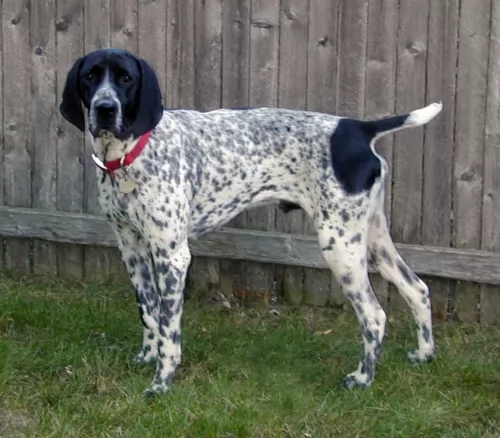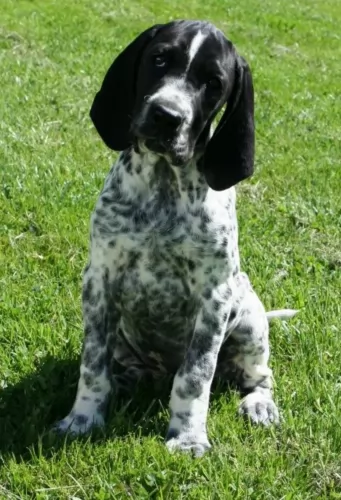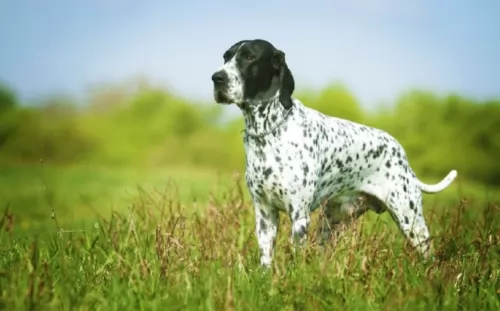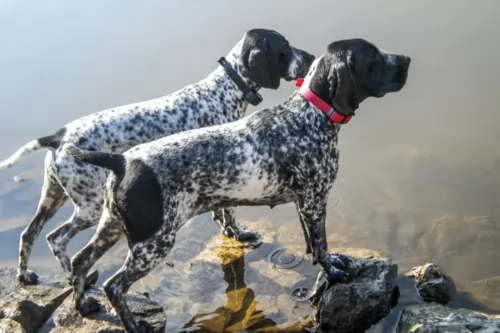 Petzlover
PetzloverBraque d'Auvergne is originated from France but Toy Bulldog is originated from United Kingdom. Braque d'Auvergne may grow 30 cm / 12 inches higher than Toy Bulldog. Braque d'Auvergne may weigh 44 kg / 98 pounds more than Toy Bulldog. Both Braque d'Auvergne and Toy Bulldog has almost same life span. Braque d'Auvergne may have more litter size than Toy Bulldog. Both Braque d'Auvergne and Toy Bulldog requires Low Maintenance.
 Sometime over 5 centuries ago, in the Cantal Region of France, was born a hunting breed, that might be the real ancestor of today’s pointing hunter dogs. Perhaps the oldest of all pointing gun dog is the Braque d’Auvergne. This breed comes from Central France in the region of Auvergne. This breed was developed prior to written dog breeding records in order to hunt in this region and find, point, flush out and retrieve fowl. This breed is clearly one of if not the oldest breeds in the French Braque. There is no agreement among historians on what breed is the oldest of the European pointing dogs and where they were developed – was it Spain or was it France? It is thought that the Braque Francais Gascogne is the original one of these in the early 1600’s while the Braque d’Auvergne came soon after. Due to the different hunting needs in the different parts of France, the Braque Francais Gascogne was crossed with a lot of other local scent hounds. The Braque d’Auvergne is one of the very oldest of all of these. There are records of the breeds existence in the 1700’s. It is probable that the Braque d’Auvergne was developed by crossing local dogs with Gascogne as well as with the Petit Bleu de Gascogne and the Grand Bleu de Gascogne.
Sometime over 5 centuries ago, in the Cantal Region of France, was born a hunting breed, that might be the real ancestor of today’s pointing hunter dogs. Perhaps the oldest of all pointing gun dog is the Braque d’Auvergne. This breed comes from Central France in the region of Auvergne. This breed was developed prior to written dog breeding records in order to hunt in this region and find, point, flush out and retrieve fowl. This breed is clearly one of if not the oldest breeds in the French Braque. There is no agreement among historians on what breed is the oldest of the European pointing dogs and where they were developed – was it Spain or was it France? It is thought that the Braque Francais Gascogne is the original one of these in the early 1600’s while the Braque d’Auvergne came soon after. Due to the different hunting needs in the different parts of France, the Braque Francais Gascogne was crossed with a lot of other local scent hounds. The Braque d’Auvergne is one of the very oldest of all of these. There are records of the breeds existence in the 1700’s. It is probable that the Braque d’Auvergne was developed by crossing local dogs with Gascogne as well as with the Petit Bleu de Gascogne and the Grand Bleu de Gascogne.
In all of Western Europe, the region of Auvergne is not very populated and has unique geography in that is hilly and has many extinct and eroded volcanoes. A lot of the region is still unpopulated. In this environment, wildlife has flourished, and hunting is successful in providing food for the regions people. This circumstance with an abundance of birds, led to the breeding of the Braque Auvergne to specialize in hunting in this area. The breed is not very popular outside of Auvergne and probably never was. That fact allowed them to be devastated by the Second World War. The Reunion des Amateurs de Braque d’Auvergne (RABA) was started to promote the pure breeding and the protection of the d’Auvergnes. But when Auvergnes was occupied during the war, the slowed breeding of the Braque d ‘ Auvergne almost eliminated the breed. There might have only been about 25 dogs left following the end of the war. These remaining dogs were used to revive the breed, but it is still uncommon, but not rare. Individuals have been imported by other countries including North America. The United Kennel Club (UKC) accepted the breed in 2006 but is not accepted by the AKC (American Kennel Club). The breed is still a working breed and outside of France, very rare.
It is believed that the reason for this is that there were different breeding groups working in different directions. One of the groups wanted a smaller dog and there was also an attempt to cross French Bulldogs with Bulldogs to decrease their weight, but this breed was also not developed.
 The Braque d’Auvergne is a well built, strong hunting dog with long ears, a large head and a docked tail. His coat is white with black markings and black ears and head. The breed looks a lot like all the other pointing dogs from France. They are medium in stature and has the appearance of a working gundog. He is athletic, muscular and fit. Docking the tail is outlawed in many countries and all of the United Kingdom. In that case the tail is high on the rump and always straight. Their face and head are big for the size of the body and shaped like an oval. With a long muzzle, deep set eyes and a gentle expression, they are kindly and handsome dogs. Their skin is loose but not droopy or wrinkled like hound dogs.
The Braque d’Auvergne is a well built, strong hunting dog with long ears, a large head and a docked tail. His coat is white with black markings and black ears and head. The breed looks a lot like all the other pointing dogs from France. They are medium in stature and has the appearance of a working gundog. He is athletic, muscular and fit. Docking the tail is outlawed in many countries and all of the United Kingdom. In that case the tail is high on the rump and always straight. Their face and head are big for the size of the body and shaped like an oval. With a long muzzle, deep set eyes and a gentle expression, they are kindly and handsome dogs. Their skin is loose but not droopy or wrinkled like hound dogs.
The Toy Bulldog was a medium sized dog standing at between 25 to 35cm in height and weighing between 11 and 18kg.
The coat of the dog was short and smooth and came in colors such as white and fawn, red or brindle. He had quite a bit of soft skin around the face and neck.
He was a small dog with a large body, short legs, broad muzzle, small ears and a docked tail.
The coat was glossy and short and they had soft skin and hair around the neck and head. They come in a variety of different colors ranging from pale yellow, light fawn to solid red.
The Toy Bulldog was a loyal and affectionate dog towards his human family It’s a pity he became extinct because he was amusing and entertaining, a great friend and companion.
They were calm dogs and didn’t require a lot of space and would have adapted well to life in the city or the countryside.
 This is a gentle, adaptable and obedient breed. With their intelligence and affectionate nature, they make great family dogs and are eager to please their people. Living with other dogs is fine but not with small, prey size animals. The Braque d’Auvergne should never be left alone pets like gerbils and hamsters. They must be socialized to cats as pets and not prey before living with them successfully. They need to work closely with one human partner. They are first and foremost a hunting dog and need some sort of hunting simulation. They are devoted to their families and want to be constantly in their presence. This can lead to separation anxiety if they are left alone too much. They are great with children and need a family.
This is a gentle, adaptable and obedient breed. With their intelligence and affectionate nature, they make great family dogs and are eager to please their people. Living with other dogs is fine but not with small, prey size animals. The Braque d’Auvergne should never be left alone pets like gerbils and hamsters. They must be socialized to cats as pets and not prey before living with them successfully. They need to work closely with one human partner. They are first and foremost a hunting dog and need some sort of hunting simulation. They are devoted to their families and want to be constantly in their presence. This can lead to separation anxiety if they are left alone too much. They are great with children and need a family.
The Toy Bulldog was friendly, docile, calm and gentle although tending to be a little bit stubborn.
He no doubt made a wonderful pet and would have been ideal for single people, families as well as older people. He would have made a splendid pet, and would have been an indoor kind of pet.
Not particularly high in energy, he would have enjoyed some exercise just to ensure he didn’t put on weight. He’s extinct now, but there are other popular bull dog breeds, and something of him lives on in these modern bulldogs.
 The Braque d’Auvergne is a healthy breed but can face some of the same health concerns as other pointers and hunting dogs. The long, droopy ears can get infected easily if wet and need to be cleaned regularly so that food or dirt are not trapped their either. Because of the small gene pool however they may be at risk for several issues. The breeders in France express concerns about possible hip dysplasia and testing is highly recommended. Because they are at risk for other conditions that might not show up until later in life, it is also recommended that they be tested by the Canine Eye Registration Foundation (CERF) as well as the Orthopedic Foundation for Animals (OFA).
The Braque d’Auvergne is a healthy breed but can face some of the same health concerns as other pointers and hunting dogs. The long, droopy ears can get infected easily if wet and need to be cleaned regularly so that food or dirt are not trapped their either. Because of the small gene pool however they may be at risk for several issues. The breeders in France express concerns about possible hip dysplasia and testing is highly recommended. Because they are at risk for other conditions that might not show up until later in life, it is also recommended that they be tested by the Canine Eye Registration Foundation (CERF) as well as the Orthopedic Foundation for Animals (OFA).
It is believed that that these dogs were healthy in their day but were no doubt prone to some canine illness issues just like any other dogs.
They would likely have battled with eye issues such as cherry eye, as well as joint problems.
Cherry eye in dogs may not mean your dog’s life is in danger, but left untreated it can cause bigger eye problems later on.
Unlike a human being, a dog has 3 eyelids, with the 3rd one giving added protection to the dog’s eyes. It’s job is to keep dirt from entering the eyes.
There is a gland in the 3rd eyelid which can move out of place and then it bulges. This is what cherry eye is. The eye becomes irritated and the gland produces discharge. It is best to get your dog to the vet who has the skills and know-how to push the gland back into place.
 The Braque d’Auvergne needs a high-quality diet fit for a working dog but not too much to make him obese. They are an active breed to choose a formula that is designed for working dogs.
The Braque d’Auvergne needs a high-quality diet fit for a working dog but not too much to make him obese. They are an active breed to choose a formula that is designed for working dogs.
Although no studies have been conducted on the Braque d’Auvergne’s health issues there are many conditions that similar breeds are susceptible to and the d’Auvergne might be as well. This includes any of the following:
This is an active, working dog who needs a lot of stimulation and exercise. The only real appropriate exercise for these dogs is hunting or outings in the woods. He not only needs the exercise, but he also needs to stimulate his sense of smell and his gundog intelligence. He might excel in lure chase or even a form or barn hunt. They certainly could excel at obedience trials and perhaps rally. If you are a weekend hunter then this is the ideal dog for you. They are so easy to train that they surpass other pointers for success with casual hunters. They hunt at a slower pace than many other gundogs. Their intelligence and athleticism lend itself well to agility and flyball also. They need a large (+acres)fenced in area to run and play.
The Toy Bulldog would have needed healthy, quality food to remain healthy. It is believed he became extinct in the early 1900s. Maybe there weren't commercially manufactured dog foods then. Their owners possibly tossed them scraps from the table.
Any dog would have to receive a good quota of vitamins and minerals in their food to stay healthy. If the dog was around today, you would read on the packaging label to see what to give him and definitely include some tasty home-made food too.
Nothing spicy and exotic – just plain, boiled chicken, brown rice, sweet potatoes and spinach. Simple foods like this ensure a dog remains free of stomach ailments.
The Toy Bulldog with his short coat would have been easy to groom. He would have required a brush twice a week.
You had to be careful with a dog like this. He didn’t tolerate the heat well. He was not suited for running or jogging and could have developed heat stroke and weakness with his excessive panting. All the huffing and puffing and sweating would have irritated his skin as well.
He would have needed a warm, dry place to sleep indoors. If he went outside, he would have required shade and sunshine to lie in.